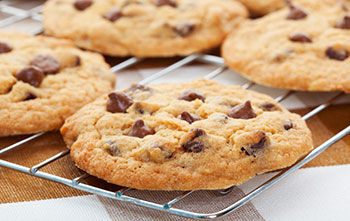More Health and Nutrition Bites
Related
Perception Matters
I was giving a talk the other night and as part of it there was a discussion of how the perceptions of what we eat can guide our consumption. One of my favorite researchers, Brian Wansink, has published numerous studies showing that how we think about food influences what we eat. His work has both the ability to help us understand how we look at food but also to laugh at ourselves a bit over how easily we can be duped by our perceptions.
Smaller bowls and serving spoons means smaller portions
My mom loves ice cream and eats it pretty much every night. I'm not so sure that she'll be very happy with my telling you this but it wouldn't be the first time that I have done something wrong that my mother had to correct me for. She has lived a pretty healthy life and while I chide her for having a variety of choices of frozen delights in her freezer a small bowl of ice cream does make her happy.
Size Does Matter
Many diet plans and diet books for years have recommended using small plates to make it look like you are eating more. This concept was put to the test by two researchers, Brian Wansink and Matthew Cheney. In a research letter published by the Journal of the American Medical Association they showed that the size of serving bowls makes a difference on the amount people eat.
Health & Nutrition Bites
Get the latest health and diet news - along with what you can do about it - sent to your Inbox once a week. Get Dr. Gourmet's Health and Nutrition Bites sent to you via email. Sign up now!
Don't let the brand fool you

Back in 2009 I shared with you a study which showed that if people think a cookie is healthy, they'll eat more of them. A lot more of them - about 35% more on average.
This healthy "halo effect" isn't limited to the description of the food, as you might guess. The food's brand carries an effect, as well. Researchers in the Psychology department at The College of William & Mary have just published a study in the journal Appetite (2014;82:1-7) looking at the interaction between brand perception, calorie information, and the individual's intake of a snack food.
188 undergraduate women (aged between 18 and 26) participated in the researchers' feeding study. The snack item the psychologists selected to use for the study was an oatmeal chocolate-chip cookie, chosen deliberately because of its combination of healthfulness (the oatmeal) and unhealthfulness (the chocolate chips).
Each participant was told that the purpose of the study was to "examine taste-perceptions in snack foods popular among college students." They were each given three of the cookies along with a taste test questionnaire labeled with a snack food brand and instructed to eat as many of the cookies as they wished while filling out the questionnaire. The researchers had previously assigned each participant to one of two groups: a Kashi® group or a Nabisco® group. The reasoning here was that Kashi® is associated with healthier foods, while Nabisco® is associated with unhealthy foods (the participants were also read a brief script describing each brand in that way). The two groups were then further separated into three groups: one group's questionnaire included a calorie count per cookie of 130 calories per cookie; a second group's questionnaire included a calorie count of 260 calories per cookie; and a third group's questionnaire included no calorie information (just the brand of the cookie).
How many cookies did the participants eat?
The participants who received the 130-calorie count on their questionnaires rated the taste of the cookies about the same, regardless of which brand the cookie was labeled. Those who received the 260-calorie count on their questionnaire, however, rated their cookies quite differently: those receiving the Healthful Brand (Kashi®) cookies rated their cookies as tasting much better than those whose cookies were labeled with the Unhealthful Brand (Nabisco®). Those with no calorie information provided rated their cookies in much the same way as those with the 260-calorie count. Unsurprisingly, those with the 130-calorie counts ate more cookies than those with the 260-calorie counts.
The researchers also analyzed the results in light of an additional questionnaire the subjects filled out, which measured whether they were "restrained eaters" (people who consciously restrain their food intake in order to lose or maintain their weight) or "unrestrained eaters" (people who aren't as concerned about restraining their eating). Restrained eaters, they found, ate about the same amount of healthful-branded cookies regardless of the calorie label. On the other hand, restrained eaters ate more of the lower-calorie unhealthful cookie than they did the higher-calorie or no-calorie-labeled unhealthful cookies. In fact, they ate more of the lower-calorie unhealthful cookies than cookies labeled any other way - even the healthy, low-calorie cookies. Unrestrained eaters, however, ate more of the healthful cookies than the unhealthful cookies regardless of the calorie counts.
What this means for you
The researchers theorize that while unrestrained eaters might have been more concerned about eating healthier cookies (given that they ate more of them), restrained eaters might have mentally justified to themselves eating more of the lower-calorie unhealthful cookies because they were lower calorie. If you're watching your weight, bear in mind that while making healthier choices is part of an overall healthy lifestyle, that doesn't mean that you can eat unlimited amounts of healthy foods. The total number of calories in what you eat matters as well.
First posted: August 6, 2014
